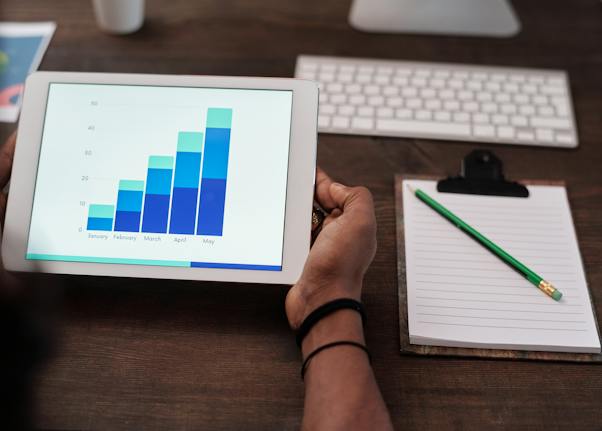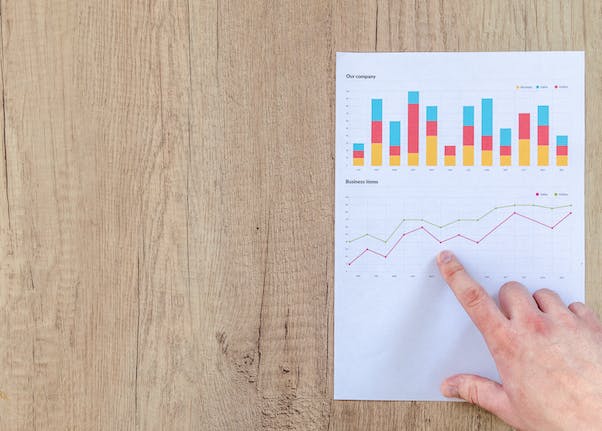From Reports to Business Dashboards: A Strategic Shift for Time-Savvy Businesses
 How you view your business data and how you interact with it has a huge impact on the success of your organization. The way we interact with our data is changing rapidly, and businesses need to adapt or risk being left behind.
How you view your business data and how you interact with it has a huge impact on the success of your organization. The way we interact with our data is changing rapidly, and businesses need to adapt or risk being left behind.
What is a Business Dashboard?
A business dashboard is like a smart, user-friendly control center for running a business. Imagine it as a super helpful tool that shows you the most important stuff you need to know about how your company is doing. It's all about keeping an eye on key performance indicators (KPIs), which are like the special numbers that tell you if things are going well or if there's room for improvement.
People really like business dashboards these days because they're like superheroes for saving money. Instead of spending a bunch of time digging through boring reports or confusing spreadsheets every day or week, you get this awesome power BI dashboard example that gives you the latest updates. It's like having a superpower to make quick decisions based on what's happening right now.
The cool thing is that these dashboards are made to be super easy to use. They're like your friendly guide, showing you a quick summary of the important stuff with cool charts and graphs. It's like a visual story of how different parts of your business are doing over time. With a glance, you can see trends, spot any issues, find opportunities for growth, and make smarter decisions. It's like having a trusty sidekick helping you navigate the business world.
The Evolution of Reporting
 The way we report stuff has gone through quite a journey, all because we wanted things to be faster and spot-on. Back in the day, companies used to depend on printed reports – you know, the paper kind – to keep tabs on what's happening in their business and decide what moves to make. But as technology got cooler and easier to get our hands on, businesses started craving quicker ways to grab their data. That's when digital reporting stepped in to save the day and meet that need for speed.
The way we report stuff has gone through quite a journey, all because we wanted things to be faster and spot-on. Back in the day, companies used to depend on printed reports – you know, the paper kind – to keep tabs on what's happening in their business and decide what moves to make. But as technology got cooler and easier to get our hands on, businesses started craving quicker ways to grab their data. That's when digital reporting stepped in to save the day and meet that need for speed.
Digital reporting has been made possible by the internet, cloud computing, and big data all technologies that were developed over time as people worked together with one another toward common goals like making life easier or improving workflows within organizations.
Digital reporting has made it easier for organizations to track their business operations and make decisions. In the past, companies relied on printed reports to keep tabs on their workflows and finances.
The Rise of Business Dashboards
 You may have heard about business dashboards, but you might not know what they are or why they're important. A dashboard simply displays information in an easy-to-digest format that allows users to make better decisions faster. Businesses have been using dashboards for years; they just didn't call them that!
You may have heard about business dashboards, but you might not know what they are or why they're important. A dashboard simply displays information in an easy-to-digest format that allows users to make better decisions faster. Businesses have been using dashboards for years; they just didn't call them that!
The rise of business dashboards is a strategic shift for time-savvy businesses looking to use their data more effectively and efficiently. Rather than just reporting on existing performance, dashboards can be used as an early warning system for problems before they become serious issues. Imagine company dashboards as your trusty sidekick, always keeping you in the loop about how your business is doing right now.
They're like your superhero glasses, allowing you to see the real-time performance of your business. If there's a hiccup or a glitch, you spot it in a flash and can swoop in to fix things pronto. Think of these dashboards as your very own treasure maps guiding you through the business jungle. They're not just about showing you what's happening; they're like secret maps revealing hidden opportunities to level up your business game.
Armed with all this awesome info right at your fingertips, you get to make decisions that feel almost superhero-like – deciding the next big moves for your business. It's like having a superpower that lets you steer your business in the perfect direction.
Key Advantages of Business Dashboards
Dashboards are more than just a collection of reports. They're designed to be quick, easy to understand and actionable. This means that dashboards can provide you with a single source of truth for all business metrics.
You can use dashboards for strategic decision-making by focusing on specific KPIs that are most important for your organization at any given time and then monitoring them closely so you know when something needs attention or adjustment.
Dashboards are also a great way to communicate with your team. If you’re trying to explain the importance of a specific metric or how it relates to their work, dashboards can be an effective tool. By showing them how changes in these metrics affect the company as a whole, you can help them understand why they need to focus on certain areas of business (and why other things might not seem so important).
Implementation Challenges and Best Practices
 Implementing a business intelligence solution can be a challenge. There are many factors to consider, including:
Implementing a business intelligence solution can be a challenge. There are many factors to consider, including:
- What is the right solution for your organization?
- How will you integrate data from multiple sources?
- What is the quality of your data, and how can it be improved?
- How do you ensure data security and compliance with regulations like GDPR or HIPAA?
And finally, how do you ensure that users adopt the new tools so they become productive in them as quickly as possible and keep using them over time?
A successful data strategy is a multi-step process that begins with the right tools and ends with users who are empowered to make better decisions. The first step is to identify the right data, which can be challenging because of how many different data types exist. There’s structured data in databases, unstructured data like text files or emails, image files like photos and videos, as well as metadata (data about your other data). Then, there’s social media content like tweets and posts from other sources.
Conclusion
Businesses should not assume that business dashboards are the right solution for every reporting need. There are many factors to consider before making a decision, including:
The nature of your data. Are there any special considerations that might make it difficult or impossible to use standard dashboard tools? For example, if you have a large number of fields in each record (e.g., sales data), then it might not be feasible to display everything at once without overwhelming users.
Are there any restrictions on who will access the dashboard (i.e., only internal customers vs. external stakeholders)? These considerations could influence what type of tool will work best for your organization, given its unique needs and goals.